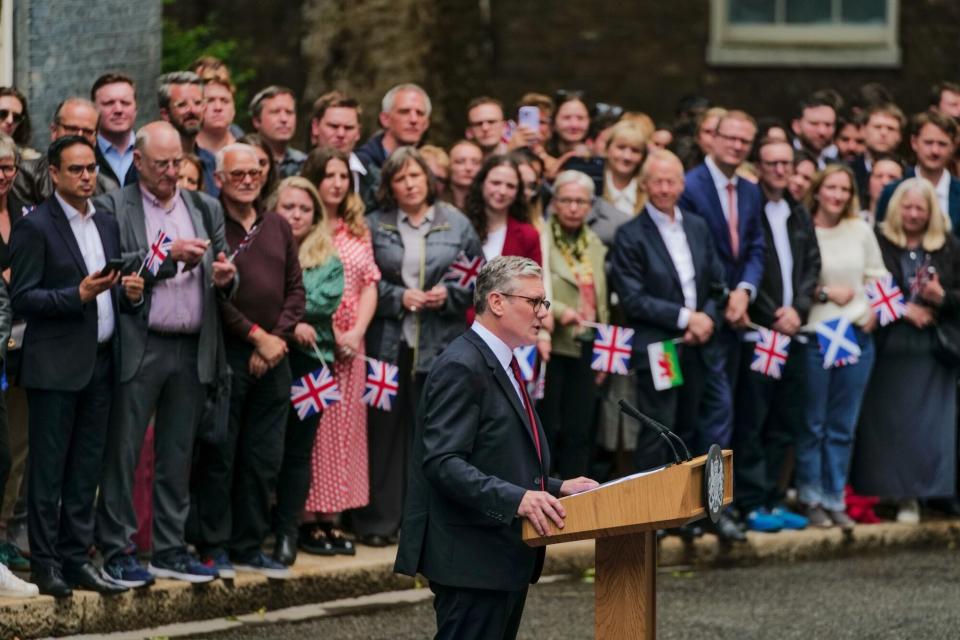Starmer Vows Stability, Moderation After Chaotic Tory Rule

(Bloomberg) -- New British Prime Minister Keir Starmer promised a government of “stability and moderation” after leading his Labour Party to a landslide election victory that ended 14 years of Conservative rule that became characterized by turmoil and infighting.
Most Read from Bloomberg
Biden Narrows Gap With Trump in Swing States Despite Debate Loss
Hedge Funds That Piled Into Big Tesla Short Stung by Huge Rally
In a dramatic reshaping of the political landscape, Labour took 412 of the 650 seats in the House of Commons, the most since Tony Blair’s 1997 triumph. The Tories garnered 121, their worst ever performance and calling time on Rishi Sunak’s stewardship of the country and his party.
Starmer, 61, vowed to “reset” British politics in a speech outside No. 10 Downing Street in London on Friday after he was formally appointed as premier by King Charles III at Buckingham Palace. “This will take a while, but have no doubt that the work of change begins immediately.” He said his administration would “rebuild Britain with wealth created in every community.”
Any Labour euphoria over the size of its win, though, will be quickly overshadowed by the scale of the challenges facing the next government.
As well as the task of getting the economy growing more quickly, the election exposed divisions that look more entrenched. Indeed, the emphatic result in terms of seat count was down to the splitting of the Tory vote in favor of more radical forces as much as an embrace of Labour policies. Labour’s vote share — at 33.7% — was only slightly higher than the 32.1% secured in 2019, when the party suffered its worst defeat in more than 80 years.
Starmer has rebuilt his party since his left-wing predecessor Jeremy Corbyn led it to that performance in the 2019 vote, which was dominated by the UK’s tortuous departure from the European Union.
That lingering tension was confirmed by the rise of voices on the right and left fringes, from Brexit architect Nigel Farage’s populist Reform UK party, to left-wing independents who campaigned against the war in Gaza. Reform emerged with five seats, with Farage entering the UK Parliament for the first time.
The shift in the UK still stands in contrast to some of its neighbors and allies. In France, parties are trying to figure out how to halt the rise of the far right after Marine Le Pen’s National Rally dominated the first round of parliamentary elections last weekend. In the US, Democrats are debating whether President Joe Biden is the man to stop Donald Trump.
Starmer on Friday spoke with Biden by telephone, telling him that the UK’s support for Ukraine will be “unwavering” and that he looked forward to working with the US “across the breadth of the relationship,” according to a readout from No. 10.
After ousting the Conservatives, Starmer sought to draw a contrast with their time in office. He assured Britons that “you have a government unburdened by doctrine.” He also acknowledged the majority of voters who didn’t vote for Labour, promising to show that politics can be a force for good. “This wound, this lack of trust can only be healed by actions, not words,” he said.
Financial markets have been sanguine. The pound staged its longest winning streak in four years to touch a three-week high and trade around $1.28. The FTSE 100 Index added 0.3%, with shares in homebuilders among the best performers as investors look to Labour’s pledge to put up more houses.
Labour also sought to keep markets onside in the run-up to the vote. Rachel Reeves, a former Bank of England economist, was key to Labour’s pitch to business. As he named his cabinet on Friday, Reeves became the UK’s first female Chancellor of the Exchequer.
Other key appointments included Foreign Secretary David Lammy, Home Secretary Yvette Cooper, Business Secretary Jonathan Reynolds, and Darren Jones, who was made chief secretary to the Treasury, the finance ministry’s no. 2 job.
Starmer also installed figures with key expertise in the House of Lords to take up ministerial positions. Patrick Vallance, who helped steer the UK through the Covid-19 pandemic as the government’s chief scientific adviser, was named a minister in the Department for Science, Innovation and Technology; human rights lawyer Richard Hermer was named attorney general, and James Timpson — who as Chief Executive Officer of shoe repair company Timpson Ltd. has advocated for the employment and rehabilitation of prisoners, was named minister for prisons, parole and probation.
--With assistance from Ellen Milligan, Joe Mayes, Aisha S Gani, Celia Bergin and Irina Anghel.
(Updates with Biden call, ministerial appointments, starting in ninth paragraph.)
Most Read from Bloomberg Businessweek
Dragons and Sex Are Now a $610 Million Business Sweeping Publishing
The Fried Chicken Sandwich Wars Are More Cutthroat Than Ever Before
For Tesla, a Smaller Drop in Sales Is Something to Celebrate
©2024 Bloomberg L.P.

 Yahoo Finance
Yahoo Finance 